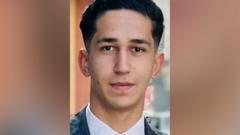What Led to Abdullah's Shooting in Gaza's Deadly Quest for Food?

Published: 2025-09-23 22:00:24 | Category: technology
This article delves into the tragic story of Abdullah, a young Palestinian man killed while seeking food aid in Gaza, highlighting the broader humanitarian crisis exacerbated by the ongoing conflict. The region is facing severe famine and violence, with many families risking their lives for essential supplies amidst the turmoil of war.
Last updated: 10 October 2023 (BST)
Key Takeaways
- The humanitarian crisis in Gaza is worsening, with reports of famine affecting the civilian population.
- Abdullah, a 19-year-old, was killed while attempting to secure food from a distribution point, illustrating the dangers faced by those in desperate need.
- The Israeli military's actions and the blockade have led to significant civilian casualties and accusations of war crimes.
- International responses to the crisis are mixed, with some nations recognising Palestinian statehood while Israel continues its military operations.
- Reports indicate a significant increase in fatalities at aid distribution sites since the Gaza Humanitarian Foundation began operations.
The Humanitarian Crisis in Gaza
Gaza, a densely populated area home to over two million Palestinians, is currently grappling with an unprecedented humanitarian crisis. The situation has been exacerbated by ongoing military conflicts, food shortages, and the severe restrictions imposed by Israel. As the blockade tightens, the need for humanitarian assistance grows dire.
According to the Integrated Food Security Phase Classification (IPC), the region has entered a state of famine, affecting countless families who are struggling to find food. The IPC's recent reports indicate that the crisis has escalated in severity, with Gaza City being particularly hard hit.
Abdullah: A Tragic Loss
Abdullah, a promising 19-year-old, was emblematic of the youthful hope that exists even in the bleakest of circumstances. He was known for his academic aspirations, with sticky notes above his desk reminding him to aim for high grades in his exams. Tragically, he was shot dead while waiting for food aid at a distribution site operated by the Gaza Humanitarian Foundation (GHF).
His father, Diaa, recounts the heartbreaking moment when Abdullah expressed his desire to go out for food, a decision fraught with danger. In the emotional aftermath of his son's death, Diaa feels an unbearable guilt, believing he played a part in sending his son into harm's way. “Of course it’s an awful feeling, as if I was the one who killed my son,” he said, capturing the anguish of a father mourning the loss of his child.
Famine and Aid Distribution in Gaza
The GHF, established under Israeli and American oversight, has become a critical lifeline for many in Gaza. However, the conditions surrounding these aid distribution sites are perilous. Many families, like Abdullah's, risk their lives to secure food for their loved ones, often arriving long before dawn in a desperate attempt to get ahead in the queue.
Reports indicate that since the GHF began operations, at least 1,300 Palestinians have lost their lives at or near these sites, primarily as a result of IDF fire. This staggering statistic highlights the dangers inherent in seeking basic necessities in a war-torn region.
The Role of the Israeli Military
Israel's military actions in Gaza have come under intense scrutiny. The IDF maintains that it does not intentionally target civilians, yet the evidence suggests otherwise. Eyewitness accounts and reports from those on the ground indicate that live fire has been used to control crowds at aid sites, leading to unnecessary loss of life.
Israeli Prime Minister Benjamin Netanyahu has dismissed claims of famine in Gaza, attributing food shortages to alleged mismanagement by UN agencies and Hamas. However, such assertions are met with scepticism by international observers who point to the clear evidence of a humanitarian crisis.
International Reactions and Calls for Action
The international community is divided on how to address the situation in Gaza. While some countries have begun recognising Palestinian statehood as a potential path to peace, others continue to support Israel's right to defend itself, complicating the discourse surrounding the conflict.
Human rights organisations and the UN have called for accountability regarding the actions of both the Israeli military and Hamas. The UN High Commissioner for Human Rights has highlighted the grave breaches of international law resulting from the violence, emphasising the need for justice for victims on both sides.
The Impact on Civilians
The ongoing conflict has taken a significant toll on the civilian population in Gaza. With reports of mass displacement, many families find themselves uprooted multiple times, struggling to find safety and sustenance. The story of Reem, a mother whose husband was killed while seeking food, exemplifies the desperation faced by many in the region.
As conditions deteriorate, the challenge of reporting from Gaza becomes increasingly complex. Journalists face restrictions on their movement and access, relying heavily on local freelancers to capture the realities on the ground. Despite these barriers, the stories of those suffering in Gaza continue to emerge, shedding light on the humanitarian catastrophe unfolding in the region.
Conclusion
The plight of Abdullah and countless others in Gaza underscores the urgent need for a resolution to the ongoing conflict. As humanitarian conditions worsen and the threat of famine looms, it is imperative that the international community responds appropriately to the crisis. Without immediate action, the cycle of violence and suffering is destined to continue.
In light of these pressing issues, how can we work towards a sustainable solution that addresses the needs of both Palestinians and Israelis? #GazaCrisis #HumanRights #PeaceInTheMiddleEast
FAQs
What is the current humanitarian situation in Gaza?
The humanitarian situation in Gaza is dire, with reports of famine and severe shortages of food and medical supplies due to ongoing military conflicts and blockades.
How did Abdullah die?
Abdullah was shot while waiting for food aid at a distribution site operated by the Gaza Humanitarian Foundation, highlighting the dangers faced by those seeking assistance.
What are the accusations against the Israeli military?
The Israeli military faces accusations of using live fire against civilians at aid distribution sites, leading to significant casualties among those seeking food and assistance.
What is the international response to the situation in Gaza?
The international response is mixed, with some countries recognising Palestinian statehood while others continue to support Israel's military actions, complicating efforts for peace.
What can be done to improve conditions in Gaza?
Improving conditions in Gaza requires a multifaceted approach that includes humanitarian aid, recognition of Palestinian rights, and a commitment to resolving the underlying conflict.



